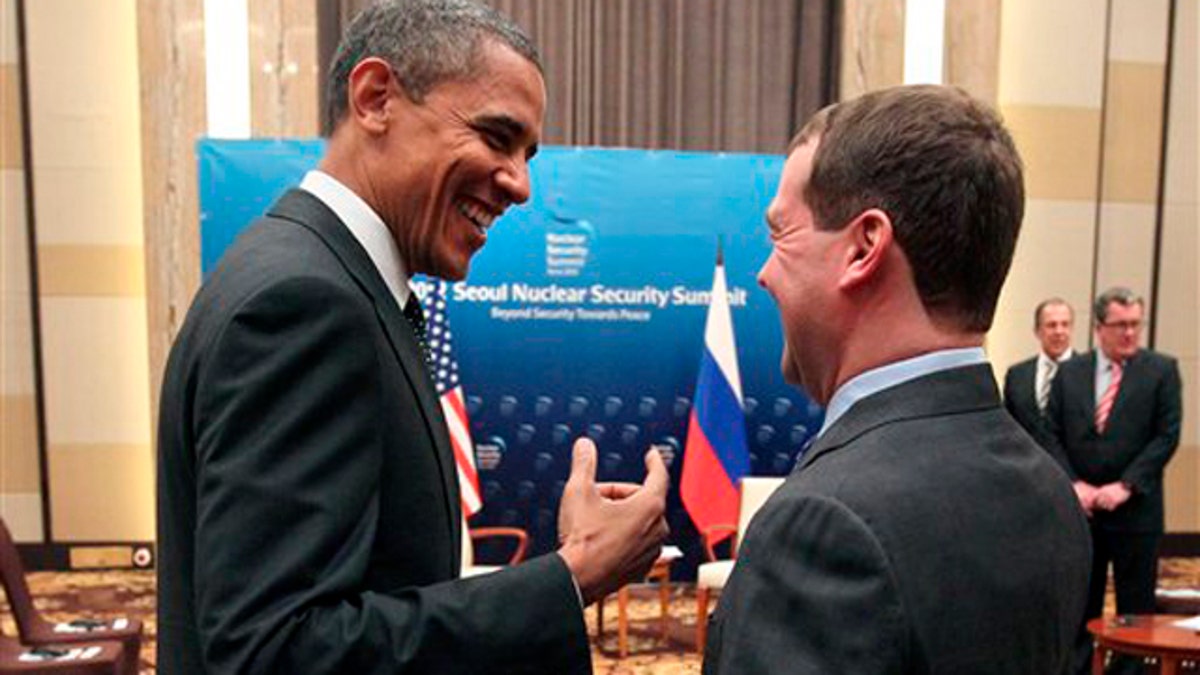
President Obama and Russian President Dmitry Medvedev talk following the conclusion of their bilateral meeting at the Nuclear Security Summit in Seoul, South Korea. (AP)
At the Seoul Nuclear Security Summit, President Obama chose a public moment to offer a private assurance to outgoing Russian President Dmitri Medvedev. As he patted the Russian leader's hand, Obama was unaware his words were picked up by an open microphone.
"On all these issues," the president said, "but particularly missile defense, this can be solved, but it's important for him to give me space. This is my last election. After my election I have more flexibility."
"I understand," Medvedev replied. "I will transmit this information to Vladimir," referring to the incoming president (and former KGB chief) Vladimir Putin.
Like most liberals, Barack Obama desperately wants to be liked by the Russians. After the election (when he has nothing to lose), he'll be free to cut a deal with the Russians that would be fatal to his re-election today.
In November 2009 — three months after Obama scrapped the missile defense shield in Eastern Europe — I was in Poland meeting with Lech Kaczynski, Poland's pro-democracy president at that time. (Five months after my visit, President Kaczynski, his wife, and most members of his government were killed in a plane crash near Smolensk, Russia.)
During my visit with Kaczynski, he asked, "Why did your president take away our missile defense shield?"
I had no answer.-- President Obama's decision was inexplicable.
An even more worrying question confronts us today: What is the missile defense issue Obama plans to "solve" with the Russians after his "last election"?
As I document in "The New Reagan Revolution," liberal Democrats have a history of going behind the backs of the American people to cut deals with the Russians. From 1978 through 1980, when Sen. Edward M. Kennedy challenged then-President Jimmy Carter in the primaries, Kennedy sent former Sen. John Tunney as a go-between to contact the Soviet KGB. Kennedy tried to coax the Soviets to sabotage Carter, the sitting president of Kennedy's own party, to boost Kennedy's election chances.
Kennedy offered to blast Carter's policy toward the Soviet occupation of Afghanistan in exchange for Soviet cooperation. Kennedy also offered to help the Soviets get their message out to the American people by bringing TV news anchors Walter Cronkite and Barbara Walters to Moscow to interview Soviet leader Yuri Andropov.
President Carter also played that game, sending industrialist Armand Hammer to meet with Soviet ambassador Anatoly Dobrynin. Carter asked the Soviets to allow Jewish refuseniks to emigrate to Israel — a move to improve Carter's standing with Jewish voters. If the Soviets cooperated, Carter promised to "remember" their help. The Soviets rejected Carter's overture.
After Ronald Reagan became president, Carter tried to use the Soviets to undermine the Reagan presidency. In January 1984, Carter went to Ambassador Dobrynin and told the Soviet emissary that the world would be better off without Reagan in the White House. That same year, House Speaker Tip O'Neill took Dobrynin aside and told him it was in the best interests of the Soviets and Democrats to keep "that demagogue Reagan" — a "dangerous man" with "primitive instincts" — from being re-elected.
Liberal Republican Sen. Charles Percy also visited Dobrynin, coaching the Soviets on how to win concessions from Reagan during arms control talks. It must have amazed Anatoly Dobrynin to see this parade of liberal American leaders pass through his office, advising him on how to undermine the American president and America's national security.
It's troubling to think that liberal American leaders would collaborate with a hostile government to undermine President Reagan at the height of the Cold War. Yet, that's exactly what they did.
Ronald Reagan stood tall and unyielding on missile defense. He walked away from the Reykjavik Summit in October 1986 when Mikhail Gorbachev demanded that he surrender the Strategic Defense Initiative. Fourteen months later, Gorbachev came back to the table in Washington and signed the Intermediate-Range Nuclear Forces Treaty.
Contrast Reagan's tough-minded approach with Obama's willingness to do Putin's bidding, removing Eastern Europe's missile defense while asking nothing in return — then, in Seoul, assuring the Russians that any missile defense problems "can be solved" after "my last election" when "I have more flexibility." (That is, when Obama has nothing to lose by giving away the store!)
Obama is maintaining a time-honored but dangerous liberal tradition of cutting side deals with the Russians that undermine our national security. If Obama wins his "last election," the whole world will have a lot to worry about.
Michael Reagan, the son of President Ronald Reagan, is a political consultant. He is also founder and chairman of The Reagan Group and president of The Reagan Legacy Foundation. Visit his website at www.reagan.com. Portions of this column are adapted from his book The New Reagan Revolution (St. Martin's Press). Copyright © 2011 Michael Reagan.








































